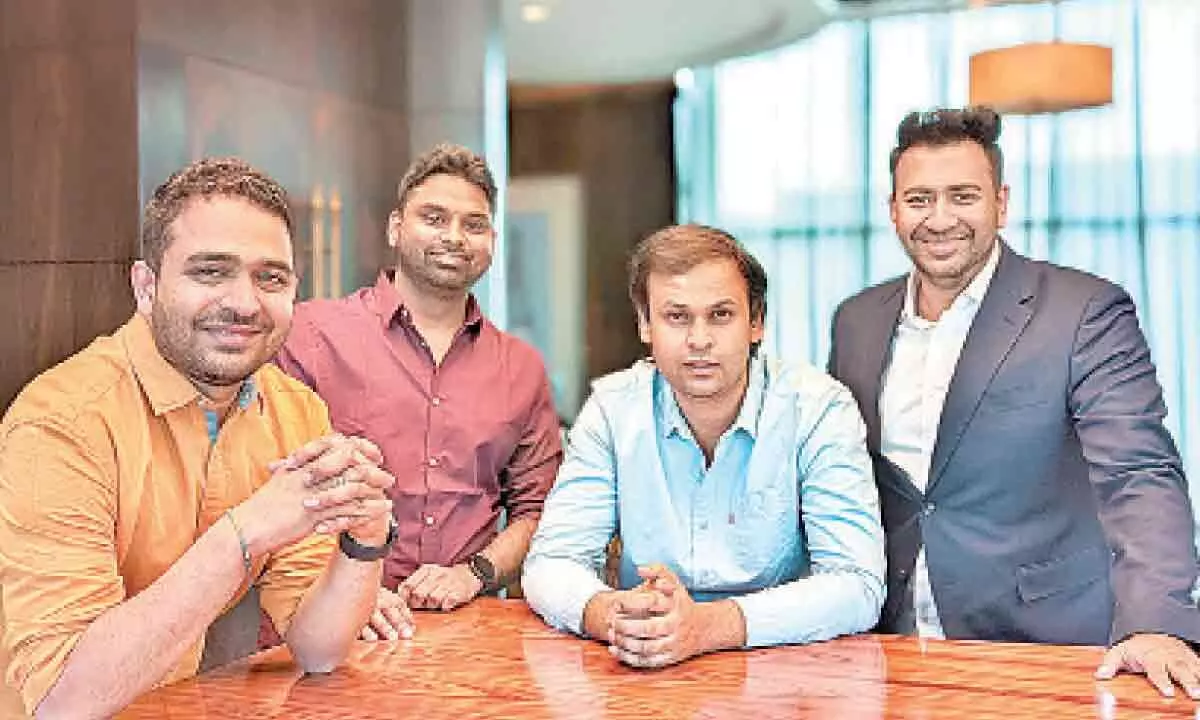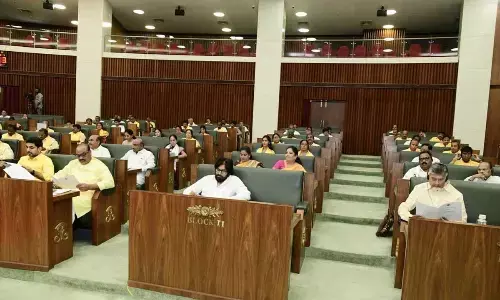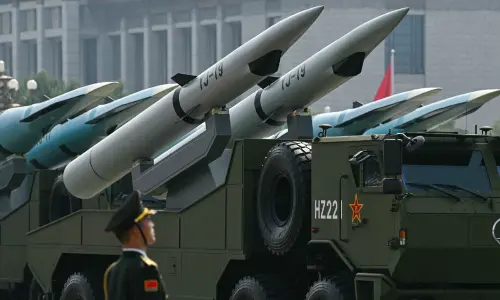Human spaceflight to be made in India soon: Dhruva Space

India’s first private space-tech company Dhruva Space Pvt Ltd has completed three space missions in less than 12 months, including the history-making Thybolt Mission on 26 November 2022, launched via ISRO’s PSLV-C54. This mission saw the launch of India’s first two private satellites, greenlit by regulatory authority IN-SPACe, to be successfully deployed into the orbit. Since its inception in November 2012, the Hyderabad-based company has seen a remarkable evolution over the years. Sanjay Nekkanti (CEO), Chaitanya Dora Surapureddy (CFO), Abhay Egoor (CTO) and Krishna Teja Penamakuru (COO) are the co-founders of Dhruva Space. In an exclusive interview with The Hans India, they revealed their plans to build some of the critical elements related to human spaceflight.
Hyderabad : How is Dhruva positioned to meet the growing demand for full-stack space engineering services? Sanjay Nekkanti, Chief Executive Officer: Typically having a space mission in orbit entails working with many suppliers. This has a huge impact on cost, reliability and turnaround times.
The timing of the vitalisation of the Private Space Sector has been integral, considering there are many small satellite requirements globally. The projections are estimated to be in the tens of thousands in number; in order to meet any of those demands, the global supply chain needs to be robust and strong. These startups that exist in the ecosystem along with 400-odd companies that build small components for the Indian Space Programme are gearing up to benefit from this sudden ‘Space Rush’.
Providing a full stack solution – where we provide satellite platforms and their subsystems, launch solutions through our deployers, and tracking and operation services through Ground Stations – is Dhruva Space’s competitive advantage as we can send up missions faster, economically without impacting reliability.
This is the need of the hour in the age where customers are not looking at sending just one or two satellites to Space but rather considering sending dozens of satellites to Space, to improve satellites-enabled services on planet Earth. Combine this with our upcoming spacecraft manufacturing facility, and Dhruva Space is ready to meet the growing global demands for satellite-enabled services across the board.
Tell us about the new Design, Engineering, Assembly, Integration & Testing facility coming up and what it means for the Indian space sector.
Sanjay Nekkanti: We had long been speaking about the upcoming facility, but we recently had revealed some renderings of the site, done by our architect partners. The reveal sends a message to the world that India is going to compete on the world stage for Space business. Our country has a remarkable Space history of more than 60 years, and we are happy to be building upon this.
Building the Design, Engineering, Assembly, Integration & Testing facility in the Shamshabad area is a critical part of our strategy for Dhruva Space’s growth and resilience – integral in helping Dhruva Space realize its full potential as a full-stack space company. We are thankful to Telangana government for developing the necessary infrastructure to make this a reality and for leading the charge on attracting increased commercial opportunities to our state’s Space industry. Hundreds of jobs are possible within this facility, which shall ensure that s pace enthusiasts of all backgrounds and experiences as well as businesses thrive in this rapidly emerging landscape.
Abhay Egoor, Chief Technology Officer: The facility will strategically be located at the TSIIC Hardware Park II in Shamshabad; we will be in close proximity to Rajiv Gandhi International Airport Shamshabad, our key customers such as DRDO Labs and also potential partners such as World Trade Centre Shamshabad who would be integral in our business capacity building.
Combined with facilities such as T-Works and the various Small and Medium Enterprises (SMEs) across Balanagar, Cherlapally and various industrial parks within the city to fabricate and test components, the spacecraft manufacturing facility will cater to the growing small satellite market, and Dhruva Space’s indigenous development of space-grade solar arrays.
Speaking of solar arrays, Dhruva Space is one of the few companies in the world that design and develop space-grade solar arrays which are vastly different from the terrestrial ones we all know about, so we are very excited about that.
I’d also like to point out that Dhruva Space also is one of the few private players to receive the Transfer of Technology (ToT) of IMS-1 satellite bus, developed by the U R Rao Satellite Centre (URSC)/ISRO; this is a versatile and efficient small satellite platform designed to facilitate low-cost access to Space. The bus serves as a dedicated vehicle for various payloads, enabling Earth imaging, ocean and atmospheric studies, microwave remote sensing, and space science missions while ensuring a quick turnaround time for satellite launches.
All in all, a testament to the ecosystem and the facility has been all three of our Space missions till date – all fully realised within the Hyderabad ecosystem before being launched into Space. Dhruva Space is already in talks with large global OEM players who are looking to leverage this infrastructure to act as a capacity doubler to cater to their global supply demands.
What are your thoughts on the future of the space tech sector in India?
Sanjay Nekkanti: Human Spaceflight is the next big thing that is going to happen in India over the next 5 to 10 years. Dhruva Space is at the inflexion point; in the next 18-24 months, we shall be setting up a Design, Engineering, Assembly, Integration & Testing Facility which can certainly contribute towards the Human Spaceflight Programme. We have already submitted proposals to ISRO for the Human Spaceflight Programme that came out in 2022.
Dhruva Space can build some of the critical elements related to the human spaceflight programme; these elements include large solar arrays for satellites that can also be used in the human spaceflights around crew capsules or space stations. Our Ground Station offerings can also contribute towards the communications infrastructure of these missions.
How are international collaborations helping to advance the field?
Sanjay Nekkanti: Dhruva Space takes a lot of pride in the partnerships we have established and nurtured as part of our growth plans. These partnerships – including the ones we have with Kinéis, Comat, Sidus Space and Skyroot, to name a few – have been established to scale-up our solutions/products across other emerging markets, where challenges and requirements may be similar to India. To sum it up, increasingly, space tech companies are looking for strategic partnerships to leverage and make use of each other’s expertise.
How would you say the ecosystem has evolved from when Dhruva was established to now? How has the evolution of the ecosystem from 10 years ago changed the operations and approaches of companies in space tech?
Chaitanya Dora Surapureddy, Chief Financial Officer: For a long time, India’s space industry was State-run; now, we observe the Government of India empowering the privatisation of the sector. There are three factors contributing to the growth in participation of private firms in the space sector: policy, access to capital and growth in the general ecosystem to serve markets outside of India. All this is fuelled by the tremendous growth of requirements for satellites globally.
A key to commercial success in the Space industry is the flight heritage of the systems. It helps that India is known for its thriving IT industry and its Space programme, the latter for which 400 assemblies have demonstrated active and continual support over the last five to six decades. The current Government has been very forthcoming in bringing about an interesting revolution where private players experience a level playing field in trying to support not just local requirements but also global requirements too.
Because the early years for the sector – during 2012-17 or so – observed a lack of risk appetite in investors, there was very limited private Space activity at all. However, since the fruition of the Startup India initiative launched by the Government of India, where Dhruva Space was the first awardees in 2020, I’ve noticed a surge in investments.
Now, the key motivations for investment in private players include: the government’s push for inclusion of private players in the Space segment, lower costs for developing and launching satellites, promise of substantial Return on Investment (RoI), and increased market demand for geospatial data, and technological advancement in the space industry.
The timing of the vitalisation of the Private Space Sector has been integral, considering there are many small satellite requirements globally. The projections are estimated to be in the tens of thousands in number; in order to meet any of those demands, the global supply chain needs to be robust and strong. These startups that exist in the ecosystem along with 400-odd companies that build small components for the Indian Space Programme are gearing up to benefit from this sudden ‘Space Rush’.
All these factors work symbiotically. We are already seeing private companies raising substantial capital, leveraging a greater degree of autonomy in making decisions while working with regulatory bodies such as IN-SPACe to maintain a certain level of accountability, and engaging the public in a more detailed dialogue around Space and Satellite Technologies. Such support will inexorably boost participation not just across startups but also investors and stakeholders, as well as progressive collaborations.”
What are Dhruva Space’s growth plans for the next few years?
Krishna Teja Penamakuru, Chief Operations Officer: The spacecraft manufacturing facility we recently announced is definitely a key part of our growth plans. Dhruva Space has a slate of payload-agnostic missions planned, one of which is a joint satellite mission with French satellite services provider Kinéis; this mission was formally announced by French Space agency CNES in July after Prime Minister Narendra Modi wound up his official tour in France.
The potential for innovative Space applications is immense, especially if established aerospace companies form partnerships with businesses that traditionally haven’t ventured into orbit, e.g. pharmaceutical, agriculture, etc companies. Satellites already play a vital role in the communications of everyone’s quotidian lives, so the imminent growth will enhance this role. There are also a number of other key launches featuring our larger satellite classes, scheduled till 2025.








